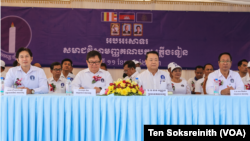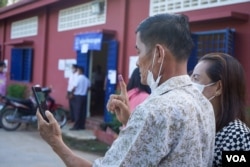Cambodia’s National Election Committee (NEC) on Monday disqualified the main opposition Candlelight Party from competing in the July national election, citing lack of paperwork.
If the decision remains in place, independent election groups said it will further undermine an election already marked by the ongoing crackdown against the government’s critics.
Longtime opposition leaders Sam Rainsy and Kem Sokha have both been removed from the political landscape due to legal troubles, and leaders of Candlelight have faced various charges and lawsuits in recent months.
The NEC has cited a bureaucratic technicality — the Candlelight has lost its original party registration document — in rejecting its application to participate in this year’s National Assembly election, which will also decide the prime minister.
“The Candlelight Party failed to submit a copy of the original party registration at the Ministry of Interior,” the NEC said in a statement released on Monday.
The Candlelight Party said in a statement on Monday that the party “can’t accept the NEC’s decision.”
The Candlelight Party spokesperson Kimsour Phirith told VOA Khmer that the party tried to request a copy of the registration document from the Ministry of Interior on May 12, but the request was rejected.
"We insisted again, but they [the Ministry of Interior] said they could not make a copy of the original document,” Kimsour Phirith said.
The ministry did issue a letter on May 5 certifying its status as a political party, but that was not accepted by the NEC in lieu of the registration document.
The Candlelight officials have pointed out that the party, even without the document, was able to participate in the commune elections in June 2022, when it won about 22 percent of the popular vote.
The ruling Cambodian People’s Party (CPP) currently holds all 125 seats in parliament.
VOA Khmer was unable to reach the Ministry of Interior or NEC for comment on Monday.
Kimsour Phirith said that the Candlelight Party will file an appeal asking the Constitutional Council of Cambodia to overrule the NEC decision.
Relaunched more than a year ago, the Candlelight Party is composed largely of officials and candidates who were part of the Cambodia National Rescue Party, which posed a major challenge to the CPP in the 2013 national election before it was dissolved by the country’s courts a few years later.
However, the Candlelight Party was registered in the 1990s as the Sam Rainsy Party. The party no longer has any official affiliation with Rainsy, who is living in exile, however the longtime opposition leader has called on Cambodians to support the new party.
Observers raised concerns over the legitimacy of any election in which the biggest opposition party is excluded.
NICFEC, a grassroots network of election observers in Cambodia, said the NEC's decision affected both civil and political rights.
“Political parties are not allowed to do politics, and cannot compete in the election. Voters lose their rights, and they cannot vote for their favorite party,” NICFEC director Sam Kuntheamy told VOA Khmer.
Korn Savang, the election monitoring coordinator for Comfrel, told VOA Khmer that the absence of the Candlelight Party in the July election means the absence of an opposition voice.
“In parliament, there cannot only be one unanimous voice. There must be an opposition voice which is an important mirror to reflect the actions or processes of the executive branch,” Korn Savang said.
The European Union issued a statement Monday, criticizing the move as “another worrying sign of shrinking space for political parties to compete” in the election.
“The European Union strongly objects to the decision taken today by the Cambodia Electoral Authority, which adds to depriving Cambodia’s citizens of the right to choose their representatives,” said an EU spokesperson.
“Democratic elections demand open, inclusive and credible political competition and citizens to be allowed to freely choose their representatives.”
Ahead of the decision, Prime Minister Hun Sen threatened arrest for any Candlelight members who protest their inability to participate in elections.
CPP spokesperson Sok Eysan denounced accusations that the government was trying to suppress its main rival.
“It’s just their own subjective idea and cannot be considered a good idea because without the Candlelight Party, people can still live in prosperity under the roof of peace,” Sok Eysan told VOA Khmer.
Rights groups and critics have accused the Hun Sen government of having created a climate of fear since 2017 by imprisoning scores of opposition politicians, activists and journalists. Many opposition figures have since fled the country, while others have been arrested.
The Candlelight Party is not the only party to have formed out of remnants of the Cambodia National Rescue Party, but it had the largest grassroots network by far. Some 7,000 members of the party gathered in Siem Reap earlier this year for the party’s first national congress.
This year’s election will also mark a pivotal moment for the ruling party, as the prime minister’s eldest son, Hun Manet, will for the first time run for public office — with the top spot on the party’s ticket in Phnom Penh — having spent his career rising through the military.
The CPP voted last year to anoint Hun Manet as his father’s successor, a transition the 70-year-old Hun Sen says will happen between 2028 and 2030.





